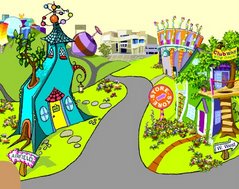Articles, Papers, and Books, oh my!
Journal Papers and Book Chapters
Kafai, Y. B. & Giang, M. T. (In Press). Virtual Playgrounds: Children’s Multi-User Virtual Environments for Playing and Learning with Science. In T. Willoughby & E. Wood (Eds), Children’s Learning in a Digital World. Blackwell Publishing, Oxford, UK.
Conference Papers and Presentations
Fields, D. A. (2007, April). Learning by Cheating? Investigating the science in cheat sites for informal educational mutli-user virtual environments. Paper to be presented at the annual meeting of the American Educational Research Association, Chicago, IL.
Feldon, D., Kafai, Y., Fields, D. A., Giang, M., & Quintero, M. (2007, April). Mixed methods for mixed reality: Overcoming methodological challenges to understand user activity in a massive multi-user virtual environment. Paper to be presented at the annual meeting of the American Educational Research Association, Chicago, IL.
Kafai, Y. B., Feldon, D., Fields, D. A., Giang, M., Quintero, M., & Peppler, K. A. (2007). Where in the World is the Science in Whyville? Symposium to be held at the annual meeting of the American Educational Research Association, Chicago, IL.
Kafai, Y.B., Feldon, D., Fields, D., Giang, M., & Quintero, M. (2007). Life in the Times of Whypox: A Virtual Epidemic as a Community Event. In C. Steinfeld, B. Pentland, M. Ackermann, & N. Contractor (Eds.), Proceedings of the Third International Conference on Communities and Technology. New York: Springer.
Fields, D. A. & Kafai, Y. B. (2007, July). Tracing Insider Knowledge Across Time and Spaces: A Connective Ethnography in a Teen Online Game World. Paper to be presented at the 8th Conference on Computer Supported Collaborative Learning, New Brunswick, New Jersey.
Kafai, Y. B. (2007, July). To cheat or not to cheat? The Purposes, Politics and Psychology of Cheating in Gaming. Symposium to be held at the Games, Learning, and Society 3.0, in Madison, Wisconsin.
Kafai, Y. B., Cook, M., & Fields, D. A. (under review). “Blacks deserve bodies too”: Design and Discussion about Race and Diversity in a Teen Virtual World. Paper submitted to DiGRA07.
Kafai, Y. B., Fields, D. A., & Cook, M. (under review). Your Second Selves: Avatar Design and Identity Play in a Teen Virtual World. Paper submitted to DiGRA07.
Fields, D. A., & Kafai, Y. B. (under review). Stealing from Grandma or Generating Cultural Knowledge? Contestations and Effects of Cheats in a Teen Virtual World. Paper submitted to DiGRA07.
Kafai, Y. B. (Accepted with Revisions). Of Monsters and Sick Computers: Children’s Folk Conceptions of Computational Viruses. Journal of Science Education and Technology.
Quintero, M. (forthcoming). Who Visits the Virtual Center for Disease Control During an Online Epidemic? A Study of Player Resource Engagement in a Multi-Player World. Unpublished Master Thesis, University of California, Los Angeles.
Fields, D. A. (2007, April). Learning by Cheating? Investigating the science in cheat sites for informal educational mutli-user virtual environments. Paper to be presented at the annual meeting of the American Educational Research Association, Chicago, IL.
Feldon, D., Kafai, Y., Fields, D. A., Giang, M., & Quintero, M. (2007, April). Mixed methods for mixed reality: Overcoming methodological challenges to understand user activity in a massive multi-user virtual environment. Paper to be presented at the annual meeting of the American Educational Research Association, Chicago, IL.
Kafai, Y. B., Feldon, D., Fields, D. A., Giang, M., Quintero, M., & Peppler, K. A. (2007). Where in the World is the Science in Whyville? Symposium to be held at the annual meeting of the American Educational Research Association, Chicago, IL.
Kafai, Y.B., Feldon, D., Fields, D., Giang, M., & Quintero, M. (2007). Life in the Times of Whypox: A Virtual Epidemic as a Community Event. In C. Steinfeld, B. Pentland, M. Ackermann, & N. Contractor (Eds.), Proceedings of the Third International Conference on Communities and Technology. New York: Springer.
Fields, D. A. & Kafai, Y. B. (2007, July). Tracing Insider Knowledge Across Time and Spaces: A Connective Ethnography in a Teen Online Game World. Paper to be presented at the 8th Conference on Computer Supported Collaborative Learning, New Brunswick, New Jersey.
Kafai, Y. B. (2007, July). To cheat or not to cheat? The Purposes, Politics and Psychology of Cheating in Gaming. Symposium to be held at the Games, Learning, and Society 3.0, in Madison, Wisconsin.
Kafai, Y. B., Cook, M., & Fields, D. A. (under review). “Blacks deserve bodies too”: Design and Discussion about Race and Diversity in a Teen Virtual World. Paper submitted to DiGRA07.
Kafai, Y. B., Fields, D. A., & Cook, M. (under review). Your Second Selves: Avatar Design and Identity Play in a Teen Virtual World. Paper submitted to DiGRA07.
Fields, D. A., & Kafai, Y. B. (under review). Stealing from Grandma or Generating Cultural Knowledge? Contestations and Effects of Cheats in a Teen Virtual World. Paper submitted to DiGRA07.
Forthcoming
Kafai, Y. B. (Accepted with Revisions). Of Monsters and Sick Computers: Children’s Folk Conceptions of Computational Viruses. Journal of Science Education and Technology.
Quintero, M. (forthcoming). Who Visits the Virtual Center for Disease Control During an Online Epidemic? A Study of Player Resource Engagement in a Multi-Player World. Unpublished Master Thesis, University of California, Los Angeles.


No comments:
Post a Comment